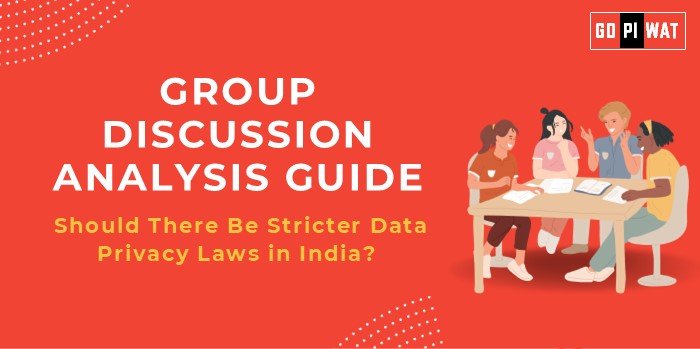📋 WAT/Essay Analysis Guide: Should There Be Stricter Data Privacy Laws in India?
🌐 Understanding the Topic’s Importance
Data privacy laws are a critical component of India’s growing digital economy, projected to reach $1 trillion by 2027-28. Stricter data protection measures are vital to safeguard users and build trust, ensuring the digital ecosystem remains secure and inclusive.
🕒 Effective Planning and Writing
- 📅 Time Allocation: 5 minutes for planning, 20 minutes for writing, and 5 minutes for review.
- 💡 Preparation Tips: Use India’s Global Cybersecurity Index status and digital economy projections as key arguments.
✍️ Introduction Techniques for Essays
- 🔄 Contrast Approach: “With 954 million internet users and a digital economy poised to hit $1 trillion by 2027-28, India must address over 1.4 million annual cybersecurity threats with stricter privacy laws.”
- ✅ Solution-Based Approach: “As India achieves Tier 1 status in global cybersecurity, robust data privacy laws are the next step to secure its $1 trillion digital economy vision.”
🏆 Achievements and Challenges
✅ Successes
- 🏅 Global Cybersecurity Leadership: India achieved Tier 1 status in the Global Cybersecurity Index 2024 with a score of 98.49.
- 📈 Growing Public Awareness: Increased awareness of data rights has spurred demand for robust privacy legislation.
- 🔒 Technology Adoption: Businesses have adopted advanced encryption and secure data-handling protocols.
- 💰 Economic Digitalization: Integration of digital platforms into mainstream economic activities supports the $1 trillion digital economy projection.
⚠️ Challenges
- 📜 Legislative Gaps: Current laws lack depth and enforcement mechanisms to address emerging threats.
- 🌐 Cybersecurity Threats: Over 1.4 million incidents were reported in 2022, highlighting vulnerabilities.
- 📉 Digital Divide: Low digital literacy in rural areas hampers effective implementation of data protection measures.
- ⚙️ Compliance Challenges: SMEs struggle to align with evolving data protection regulations.
📋 Recommendations for Sustainable Progress
- 🔗 Strengthen Legal Frameworks:
- Revise the Digital Personal Data Protection Bill to include stricter penalties for non-compliance.
- Align with global frameworks like GDPR while addressing local needs.
- 📚 Enhance Digital Literacy:
- Launch nationwide campaigns to educate citizens about data privacy rights and cybersecurity practices.
- Incorporate data protection modules in school curricula.
- 🤝 Public-Private Partnerships (PPP):
- Collaborate with tech giants to develop innovative data protection solutions.
- Establish compliance training programs for SMEs.
- 🛠️ Infrastructure and Security Investments:
- Expand internet infrastructure in rural areas to bridge the digital divide.
- Invest in AI-driven threat detection and prevention systems.
- 🏛️ Independent Regulatory Authority:
- Create an independent body to oversee compliance and adjudicate disputes.
- 🌍 International Collaboration:
- Partner with global organizations to address cross-border data sharing and cybercrime.
📄 Sample Short Essays
⚖️ Balanced Perspective
“India’s Tier 1 ranking in cybersecurity is a milestone, but without stricter privacy laws, the nation risks undermining trust in its $1 trillion digital economy.”
🔍 Solution-Oriented
“A phased introduction of robust privacy laws, tailored to India’s unique digital landscape, can ensure secure economic growth and user protection.”
🌐 Global Comparison
“India’s rise to Tier 1 cybersecurity status reflects its commitment to digital security, but adopting GDPR-like frameworks will further strengthen its global leadership.”


